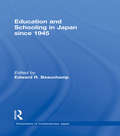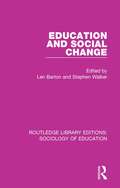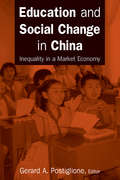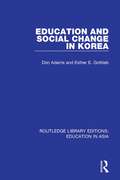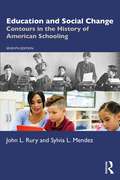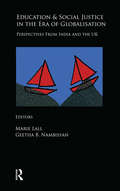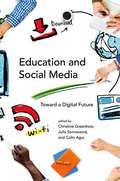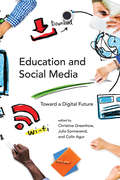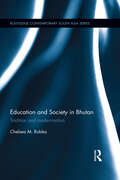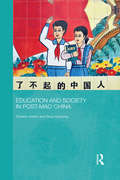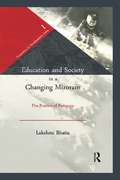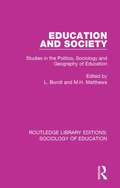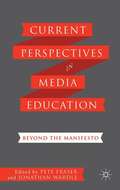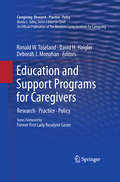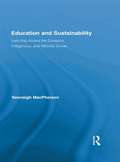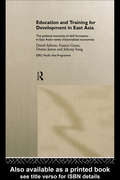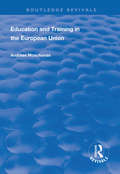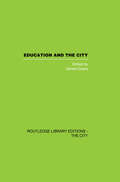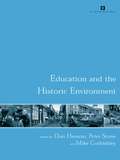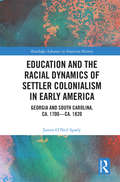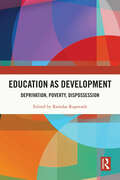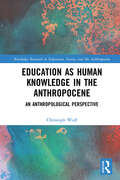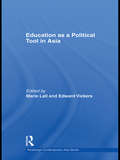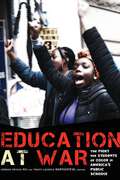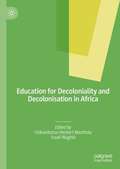- Table View
- List View
Education and Schooling in Japan since 1945 (Dimensions of Contemporary Japan #Vol. 3)
by Edward R. BeauchampFirst Published in 1999. Routledge is an imprint of Taylor & Francis, an informa company.
Education and Social Change (Routledge Library Editions: Sociology of Education #4)
by Stephen Walker Len BartonThis book, first published in 1985, argues that changes in the education system are closely bound up with wider social and political changes. It considers items within education such as developments in teacher assessment policy and changes in the control of education policy; and external items such as new directions in the management of the economy, of class relations and of the political system. Throughout, the book reflects a mood of growing frustration and anxiety shared by many teachers and educationalists which, the book argues, stems from a feeling that the education system is not being run as it should be. This title will be of interest to students of education and sociology.
Education and Social Change in China: Inequality in a Market Economy
by Gerard A. PostiglioneMarket reform, financial decentralization, and economic globalization have greatly accentuated China's social and regional inequalities. Education is expected to address these inequalities in a context of rapid social change, including the rise of an urban middle class, changed status of women, resurgence of ethnic identities, growing rural to urban migration, and lingering poverty in remote areas. But some argue that state policies have not sufficiently addressed inequitable practices, and that schools actually perpetuate and reproduce inequities, giving rise to a new system of social stratification driven more by market forces than socialist principles. Featuring all original, previously unpublished material, this volume examines this argument through analysis of selected aspects of educational stratification in China during the reform era. Chapters focus on the new urban middle class, poor rural residents, the migrant population in urban areas, rural girls, and ethnic minorities. The contributors are established scholars in the field, and they build a conceptual framework for assessing the degree to which China's educational reforms are inclusive, equitable, and integrative across social categories and groups.
Education and Social Change in Korea (Routledge Library Editions: Education in Asia #7)
by Don Adams Esther E. GottliebThis book, first published in 1993, provides students and scholars with an introduction to Korean education and the dynamics of interchange between the educational system and rapidly changing Korean society. Severe political, social and educational problems may be found in modern Korea: these conditions, together with certain persistent issues pertaining to the purposes, structure, and pedagogical characteristics of schooling make for serious contemporary debate.
Education and Social Change: Contours in the History of American Schooling
by John L. Rury Sylvia L. MendezThis concise, interpretive history of American schooling focuses on the evolving relationship between education and social change.Like its predecessors, this fully updated new edition investigates the impact of social forces such as industrialization, urbanization, immigration, globalization, and cultural conflict on the development of schools and other educational institutions. It also examines the various ways that schools have contributed to social change, particularly in enhancing the status and accomplishments of certain social groups and not others. Detailed accounts of the experiences of women and minority groups in American history consider how their lives have been affected by education at key points in the past.Updates to the seventh edition include: Enhanced coverage for understanding the experiences of Native Americans, students in poverty settings, and the LGBTQ+ community in the midst of social change. New topics include settler colonialism, indigeneity, culturally diverse education, gay and transgender educational policies, charter schools, voucher programs, and the rise of testing in schools. It has been edited throughout to update information and sources regarding the history of American education and related processes of social transformation in the nation’s past.This bestselling introductory text is essential reading for Educational Foundations, History of Education, and Schools and Society, and similar courses for pre-service teachers, educational leaders, and others.New online material includes discussion questions and links to further reading and resources, available at www.routledge.com/9781032745947
Education and Social Justice in the Era of Globalisation: Perspectives from India and the UK
by Marie Lall; Geetha B. NambissanThe book discusses the implications of globalization on education from the perspective of social justice. It looks at two countries — India and the UK — to look at how global economic and cultural processes are mediated through nation states, institutional structures and the aspirations of different social groups. It seeks to resituate the debates around education and social justice in policy, research and public discourse by highlighting the need for a more nuanced understanding of globalization and education. It also demonstrates the effects of economic dimensions — the politics of neoliberalism, and how this has shifted the understanding of state responsibilities and marginalized issues pertaining to the agenda of social justice.
Education and Social Media: Toward a Digital Future
by Colin Agur Christine Greenhow Julia SonnevendHow are widely popular social media such as Facebook, Twitter, and Instagram transforming how teachers teach, how kids learn, and the very foundations of education? What controversies surround the integration of social media in students' lives? The past decade has brought increased access to new media, and with this new opportunities and challenges for education. In this book, leading scholars from education, law, communications, sociology, and cultural studies explore the digital transformation now taking place in a variety of educational contexts. The contributors examine such topics as social media usage in schools, online youth communities, and distance learning in developing countries; the disruption of existing educational models of how knowledge is created and shared; privacy; accreditation; and the tension between the new ease of sharing and copyright laws. Case studies examine teaching media in K--12 schools and at universities; tuition-free, open education powered by social media, as practiced by the University of the People; new financial models for higher education; the benefits and challenges of MOOCS (Massive Open Online Courses); social media and teacher education; and the civic and individual advantages of teens' participatory play.ContributorsColin Agur, Jack M. Balkin, Valerie Belair-Gagnon, danah boyd, Nicholas Bramble, David Buckingham, Chris Dede, Benjamin Gleason, Christine Greenhow, Daniel J. H. Greenwood, Jiahang Li, Yite John Lu, Minhtuyen Mai, John Palfrey, Ri Pierce-Grove, Adam Poppe, Shai Reshef, Julia Sonnevend, Mark Warschauer
Education and Social Media: Toward a Digital Future (The John D. and Catherine T. MacArthur Foundation Series on Digital Media and Learning)
by Colin Agur Christine Greenhow Julia SonnevendLeading scholars from a variety of disciplines explore the future of education, including social media usage, new norms of knowledge, privacy, copyright, and MOOCs.How are widely popular social media such as Facebook, Twitter, and Instagram transforming how teachers teach, how kids learn, and the very foundations of education? What controversies surround the integration of social media in students' lives? The past decade has brought increased access to new media, and with this new opportunities and challenges for education. In this book, leading scholars from education, law, communications, sociology, and cultural studies explore the digital transformation now taking place in a variety of educational contexts. The contributors examine such topics as social media usage in schools, online youth communities, and distance learning in developing countries; the disruption of existing educational models of how knowledge is created and shared; privacy; accreditation; and the tension between the new ease of sharing and copyright laws. Case studies examine teaching media in K–12 schools and at universities; tuition-free, open education powered by social media, as practiced by the University of the People; new financial models for higher education; the benefits and challenges of MOOCS (Massive Open Online Courses); social media and teacher education; and the civic and individual advantages of teens' participatory play.ContributorsColin Agur, Jack M. Balkin, Valerie Belair-Gagnon, danah boyd, Nicholas Bramble, David Buckingham, Chris Dede, Benjamin Gleason, Christine Greenhow, Daniel J. H. Greenwood, Jiahang Li, Yite John Lu, Minhtuyen Mai, John Palfrey, Ri Pierce-Grove, Adam Poppe, Shai Reshef, Julia Sonnevend, Mark Warschauer
Education and Society in Bhutan: Tradition and modernisation (Routledge Contemporary South Asia Series)
by Chelsea M. RoblesBhutan's education sector has attracted international attention for recent reforms driven by the national development philosophy of Gross National Happiness, which aspires to balance change with the continuity of tradition. This book traces the history of education in Bhutan and reveals that, as the country has modernised and become globally connected and further influenced by international and Western mores, tensions have emerged across the education sector. The author examines how these tensions between the curriculum and local knowledges can impact teaching and learning, and offers approaches to addressing them. Based on extensive empirical data, including in-depth interviews and classroom observations, Robles analyzes the discourses of high-level officials who were involved in the early development of the modern system of education, a range of education leaders, and teachers. Filling a gap in the literature, this book is an invaluable resource for students and researchers interested in the formation of education policy, social and political reform in Bhutan, and South Asia Studies.
Education and Society in Post-Mao China (Routledge Studies in Education and Society in Asia)
by Edward Vickers Zeng XiaodongThe post-Mao period has witnessed rapid social and economic transformation in all walks of Chinese life – much of it fuelled by, or reflected in, changes to the country’s education system. This book analyses the development of that system since the abandonment of radical Maoism and the inauguration of ‘Reform and Opening’ in the late 1970s. The principal focus is on formal education in schools and conventional institutions of tertiary education, but there is also some discussion of preschools, vocational training, and learning in non-formal contexts. The book begins with a discussion of the historical and comparative context for evaluating China’s educational ‘achievements’, followed by an extensive discussion of the key transitions in education policymaking during the ‘Reform and Opening’ period. This informs the subsequent examination of changes affecting the different phases of education from preschool to tertiary level. There are also chapters dealing specifically with the financing and administration of schooling, curriculum development, the public examinations system, the teaching profession, the phenomenon of marketisation, and the ‘international dimension’ of Chinese education. The book concludes with an assessment of the social consequences of educational change in the post-Mao era and a critical discussion of the recent fashion in certain Western countries for hailing China as an educational model. The analysis is supported by a wealth of sources – primary and secondary, textual and statistical – and is informed by both authors’ wide-ranging experience of Chinese education. As the first monograph on China's educational development during the forty years of the post-Mao era, this book will be essential reading for all those seeking to understand the world’s largest education system. It will also be crucial reference for educational comparativists, and for scholars from various disciplinary backgrounds researching contemporary Chinese society.
Education and Society in a Changing Mizoram: The Practice of Pedagogy (Transition in Northeastern India)
by Lakshmi BhatiaLocated in the domain of cultural politics, the book with rich ethnographical data from Mizoram, a lesser known and understood state, brings the community, state and culture to centre-stage, along with family and stratification of the sociological discourse in education. The book argues for a re-look at school education in Mizoram, besides providing critical insights into the North East region as a whole. It also points to the dilemmas of development in that region and suggests possible ways out of the impasse. Marking a significant departure from conventional thinking on education as 'human capital' as reflected in North-East Vision: 2020, the book strongly advocates the need for critical pedagogies based on learning from conflict; inculcating the values of tolerance and compassion as a precursor to peace; reconceptualising `development, not merely as 'economic' but as indicator of national happiness and valuing lives equally besides respect for traditional institutions, thus marking a break from the much resented paternalism that underpins all state interventions in education. One of the first studies of its kind regarding experience and practice of education, the book makes an important contribution to the role that education can play to usher in peace and promote respect for differences.
Education and Society: Studies in the Politics, Sociology and Geography of Education (Routledge Library Editions: Sociology of Education #9)
by L. Bondi M. H. MatthewsThis book, first published in 1988, examines the most contentious issues in contemporary education. The political, social, educational and geographical impact of changes in the provision of educational services are discussed and illustrated through a wide range of case studies. Issues are examined from a number of different perspectives, amongst them those of the parent, the educational administrator and the organisational theorist, with the result that eh book is able to evaluate which changes are most consistent with the requirements of each group. This book will be of interest to students of sociology and education.
Education and State Formation
by Andy GreenThis book emerged from the online project 'A Manifesto for Media Education' and takes forward its starting points by asking some of the original contributors to expand upon their view of the purpose of media education and to support their perspective with accounts of practice.
Education and Support Programs for Caregivers
by Deborah J. Monahan David H. Haigler Ronald W. ToselandFor many, caring for a chronically ill family member is "the right thing to do", but it is also often a source of emotional hardship, physical stress, and social isolation. In response, skill-building, coping, and psychoeducational programs have emerged to help caregivers meet the changes and challenges in their - as well as the patients' - lives. Education and Support Programs for Caregivers reveals the diversity of the caregiver population as well as their experiences and needs, and it introduces an empirically solid framework for planning, implementing, and evaluating caregiver programs. The book synthesizes current trends, exploring the effectiveness of different types of programs (e.g., clinic, community, home based) and groups (e.g., peer, professional, self-help), and how supportive programs lead to improved care. Coverage includes: Improving service delivery of education and support programs to underserved caregivers.Cultural, ethnic, and gender issues in conducting caregiver education and support groups.Utilization patterns (e.g., a key to understanding service needs).E-health, telehealth, and other technological developments in caregiver services.Evaluating the effectiveness and sustainability of programs.Recommendations for future practice, training, policy, and advocacy.Education and Support Programs for Caregivers offers a wealth of insights and ideas for researchers, practitioners, and graduate students across the caregiving fields, including psychology, social work, public health, geriatrics and gerontology, and medicine as well as public and education policy makers.
Education and Sustainability: Learning Across the Diaspora, Indigenous, and Minority Divide (Routledge Research in Education)
by Seonaigh MacPhersonThis book critically examines the impact of migration, education, development, and the spread of English on global bio-linguistic and cultural diversity. Derived from findings from a comparative eco-linguistic study of intergenerational language, culture, and education change in the Tibetan Diaspora, the book extends its analysis to consider the plight of other peoples who find themselves straddling the Indigenous-Minority-Diaspora divide. MacPherson explores the overlapping and distinctive sustainability challenges facing indigenous and minority communities when they are connected by and within diasporas, and seeks to adequately explain the discontinuities and disjunctures between their educational struggles and achievement levels.
Education and Training for Development in East Asia: The Political Economy of Skill Formation in Newly Industrialised Economies (ESRC Pacific Asia Programme)
by Johnny Sung David Ashton Francis Green Donna JamesThe East Asian miracle, or its supposed demise, is always news. The Four Tiger economies of Hong Kong, Singapore, Taiwan and South Korea have experienced some of the fastest rates of economic growth ever achieved. This book provides the first detailed analysis of the development of education and training systems in Asia, and the relationship with the process of economic growth.
Education and Training in the European Union (Routledge Revivals)
by Andreas MoschonasPublished in 1998, Education and training in the European Union is a policy area aiming to enable young people to experience the ‘reality of Europe’ through various forms of cooperation, including training periods in firms in other member states, university courses in the Community countries and exchanges. This book examines why the Community decided to take actions in the field of education and training, what the extent of this involvement is, and how the future may affect EU decisions on education and training. It argues that the logic of the EU involvement in education and training derives from both economic and political considerations; that the extent of this involvement has not so far been very significant but is growing; and that the pace of political integration will ultimately condition the Community’s competence in the field of education and training.
Education and the City: Theory, History and Contemporary Practice
by Gerald GraceCity schools, especially those attended by working class and ethnic minority pupils are teh catalysts of many significant issues in educational debate and policy making. They bring into sharp focus questions to do with class, gender and race relations in education; concepts of equality of opportunity and of social justice; and controversies about the wider political economic and social context of mass schooling. America, Western Europe and Australia have all taken a keen interest in the problems of urban schooling. The contributors to this collection of original essays all share a concern about these problems, although they approach them from a wide range of theoretical and ideological positions. Gerald Grace and his contributors criticis the current limitations of urban education as a field of study and they present a foundation for a more historically located and critically informed inquiry into problems, conflicts and contradictions in urban schooling. Part I presents contributions on theories of the urban. Part II focuses upon the history of urban education both in Britain and the USA. Part III discusses contemporary policy and practice with essays relating to education in inner city London and in New York City. This book was first published in 1984.
Education and the Historic Environment (Issues in Heritage Management)
by Peter Stone Don Henson Mike CorbishleyPractical, inspiring and instructive, Education and the Historic Environment emphasizes the contribution to both education and heritage that results from a positive relationship between the two disciplines. Education and the Historic Environment examines evidence, case studies and chapters from a wide cross section of the heritage sector and: argues for the value of using the physical remains of the past shows how and where the historic environment can be used to fit into and enhance learning examines how guidelines are reinforced looks at how physical heritage can not only be used to teach obvious subjects such as history, but are also useful across the curriculum, from literacy and numeracy to citizenship. Teachers at all levels, and students, academics and professionals in archaeology and heritage management, will all be able to use the case studies to reform and enhance their work.
Education and the Racial Dynamics of Settler Colonialism in Early America: Georgia and South Carolina, ca. 1700–ca. 1820 (Routledge Advances in American History #16)
by James O’Neil SpadyThis is the first historical monograph to demonstrate settler colonialism’s significance for Early America. Based on a nuanced reading of the archive and using a comparative approach, the book treats settler colonialism as a process rather than a coherent ideology. Spady shows that learning was a central site of colonial struggle in the South, in which Native Americans, Africans, and European settlers acquired and exploited each other’s knowledge and practices. Learned skills, attitudes, and ideas shaped the economy and culture of the region and produced challenges to colonial authority. Factions of enslaved people and of Native American communities devised new survival and resistance strategies. Their successful learning challenged settler projects and desires, and white settlers gradually responded. Three developments arose as a pattern of racialization: settlers tried to prohibit literacy for the enslaved, remove indigenous communities, and initiate some of North America's earliest schools for poorer whites. Fully instituted by the end of the 1820s, settler colonization’s racialization of learning in the South endured beyond the Civil War and Reconstruction.
Education as Development: Deprivation, Poverty, Dispossession
by Ramdas RupavathThis book is an in-depth analysis of the educational development of tribals in India. Education as Development: Deprivation, Poverty, Dispossession is a significant new addition for understanding educational and economic setbacks experienced by the marginalized in India. The volume:• Focuses on how the social, economic and education systems have evolved over time in India and identifies the scope of development in these areas;• Provides a rational structure for readers to understand how the Adivasi in India can be made to fit in the modern designed education system;• Highlights the problems of the marginalized – such as income inequality, education, health, housing, governance, civil society environment and infrastructure and others which hampers their overall growth. This book will be of great interest to students and researchers and policy makers in the fields of education, minority studies, indigenous studies, sociology of education, and South Asian studies.
Education as Human Knowledge in the Anthropocene: An Anthropological Perspective (Routledge Research in Education, Society and the Anthropocene)
by Christoph WulfThis book examines the concepts of the Anthropocene and globalisation in our society and the changes that these are bringing about in education and human learning. The book argues that there needs to be reflexive approach to issues that affect the fate of the planet and the future of humans, brought about by an education that looks to the future. Wulf argues that a change in education and socialization can only succeed based on an understanding of previous educational ideas, and considers the significance of Confucianism and spiritual education that emerged in the East. The book traces key educational ideas throughout history to show how education and human knowledge are closely linked, highlighting the need for us to pay careful attention to repetition, mimesis and the imagination in learning. It shows how a future-oriented education must engage with issues of peace and violence, global citizenship and sustainable development. This timely and compelling book will be of great interest to researchers, academics and students in the fields of philosophy of education, the history and anthropology of education, sustainability education and global citizenship education
Education as a Political Tool in Asia (Routledge Contemporary Asia Series)
by Edward Vickers Marie LallThis book offers a fresh and comparative approach in questioning what education is being used for and what the effects of the politicisation of education are on Asian societies in the era of globalisation. Education has been used as a political tool throughout the ages and across the whole world to define national identity and underlie the political rationale of regimes. In the contemporary, globalising world there are particularly interesting examples of this throughout Asia, ranging from the new definition of Indian national identity as a Hindu identity (to contrast with Pakistan's Islamic identity), to particular versions of nationalism in China, Japan, Singapore and Vietnam. In Asia education systems have their origins in processes of state formation aimed either at bolstering 'self-strengthening' resistance to the encroachments of Western and/or Asian imperialism, or at furthering projects of post-colonial nation-building. State elites have sought to popularise powerful visions of nationhood, to equip these visions with a historical 'back-story', and to endow them with the maximum sentimental charge. This book explores all of these developments, emphasising that education is seen by nations across Asia, as elsewhere, as more than simply a tool for economic development, and that issues of national identity and the tolerance - or lack of it - of ethnic, cultural or religious diversity can be at least as important as issues of literacy and access. Interdisciplinary and unique in its analysis, this book will be of interest to scholars of political science, research in education and Asian Studies.
Education at War: The Fight for Students of Color in America's Public Schools
by Arshad Imtiaz Ali and Tracy Lachica BuenavistaEducation at War: The Fight for Students of Color in America's Public Schools, attempts to shape educational research and practice to more explicitly consider the relationship between education, capitalism and war, and more specifically, its’ impact on students of color. The authors, as a whole, contend that the contemporary specter of war has become a central way that racism and materialism become manifested and practiced within education. In particular, this collection asserts that the contemporary neoliberal characterization of education and school-based reform is situated within the global political economy that has facilitated a growth in the prison and military industrial complex, and simultaneous divestment in education domestically within the U.S.Education at War attempts to make research relevant by bringing the tensions within young people’s lives to the fore. The heavy shadow cast by recent U.S. led wars re-organizes the sites of learning and teaching nationally, as well as differentially, within specific sites and upon particular communities. Nonetheless, the examination of this context is not enough. Rather, we consider how such a contemporary context can facilitate educational spaces for communities and youth to grow their vision for a different, and hopefully a more humanizing future. Thus, the book contributors will collectively explore how resistance can produce the opportunity for rich, diverse and transformative learning for marginalized students and communities.The lives of People of Color are the forefront of Education at War: The Fight for Students of Color in America's Public Schools. Whereas there are many attempts to theorize about the global implications of war, less attention is paid to the ways that war shapes young lives in the U.S., particularly in an educational context. The book addresses the absence of youth-centered discussions regarding education during a political context of neoliberalism and war, and provides important perspectives on which to ground critical discussions among students and families, education scholars and practitioners, and policymakers.
Education for Decoloniality and Decolonisation in Africa
by Yusef Waghid Chikumbutso Herbert ManthaluThis book focuses on understandings of higher education in relation to notions of decoloniality and decolonization in southern Africa. The volume draws on a range of case studies in multiple politico-cultural contexts on the African continent, and examines some of the challenges to be overcome in order to achieve education for decolonization and decoloniality. Acknowledging that patterns of exclusion, inequality and injustice are still prevalent in the African higher education landscape, the editors and contributors proffer bold attempts at democratizing education and examine how to cultivate just, equal and diverse pedagogical relations. Featuring case studies from South Africa, Zambia, Malawi, and Zimbabwe, the authors and editors examine how higher education can be further democratized and transformed along the lines of equality, liberty and recognition of diversity. This hopeful and bold collection will be of interest to scholars of decoloniality and decolonization in higher education, as well as higher education in southern Africa more specifically.
